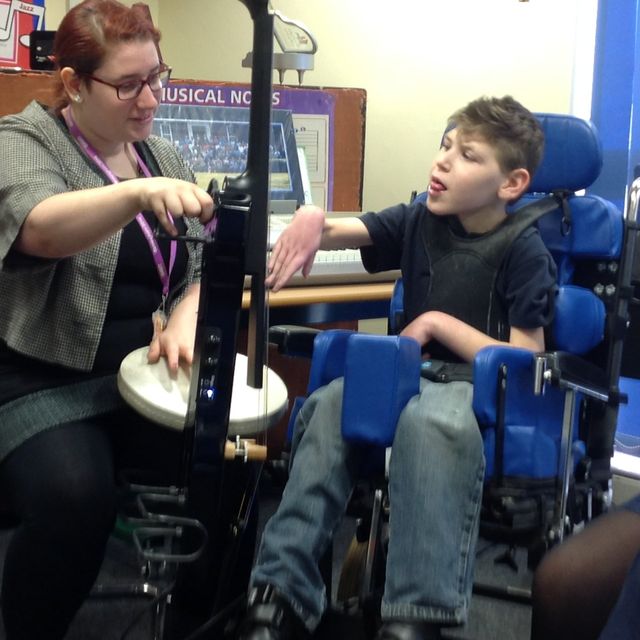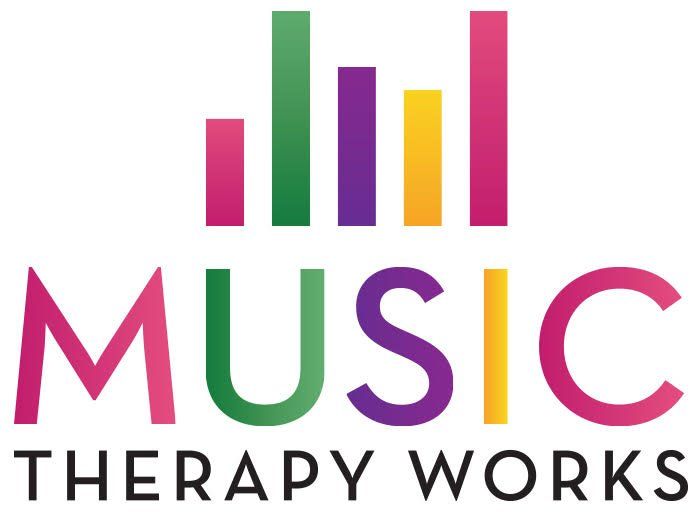Educational Settings
PEOPLE WITH SPECIAL NEEDS
Educational Settings
PEOPLE WITH SPECIAL NEEDS

Music therapy can address a number of sensory needs for children and adults with special needs as it provides concrete, multi-sensory stimulation (auditory, visual, and tactile). For example, the rhythmic component of music can assist in the cognitive organisation of sensory systems for those individuals diagnosed with autism. As a result, auditory processing and other sensory-motor, perceptual/ motor, gross and fine motor skills can be enhanced through music therapy. Music therapy sessions support the development of skills such as:
- release and exploration of emotions
- listening
- non-verbal and verbal communication
- use of both gross and fine motor movements
- sequential memory and recall of information
- self-management of behaviour
- verbal discussion
- active, improvised music making (using both instruments and voice)
Watch Caleb, an 8 year old boy, with visual impairment and learning disabilities working with Leanne,
his music therapist.
MUSIC THERAPY WORKS' SELF-DEVELOPMENT AND COMMUNICATION SESSIONS
A PROPOSAL WRITTEN FOR ONE OF OUR PURCHASERS INCLUDED HERE AS AN EXAMPLE
The sessions will be run by an HCPC registered qualified music therapist. There will be a practical learning element to the sessions but most importantly the participants will be welcomed and valued for who they are. Participants will not need to show an aptitude for music in order to benefit from the sessions.
The primary reason for running a group is to give opportunities for social interaction and improved relationships with others. The content of the sessions will be flexible from week to week. There will be opportunities for individual self- expression through playing musical instruments, and for whole group participation.
Evidence of self development may be shown in many individual ways, but as an example participants may show they are able to:
- follow simple instructions
- show awareness and respect for others
- increase their ability to wait for others to finish
- demonstrate increased concentration
- make choices with more confidence
- find new opportunities for self-expression by using the instruments and their own voices
The sessions will also facilitate communication and making choices; for example deciding which instrument to play or influencing different styles of music. Over a period of weeks, it is anticipated that participants will show increased communication, as evidenced by some of the following examples:
- improved eye contact
- an ability to adapt to playing both solo and with others
- an ability to stop appropriately when the music slows down to a stop
- improved confidence in making requests through using voice and, or gesture
- an ability to discover and use voice (relevant for mutism)
- an ability to create and use song lyrics or poetry for meaningful music making
- a wide range of instruments will be offered which provides a range of opportunities for creating new sounds and methods of playing. Where appropriate, instrument modifications can be made in order to accommodate different styles of playing. This may be especially important for those who have limited movements

“Due to music therapy... we have noticed that the school is a calmer place to be. We have also noticed that there has been an increase in turn-taking skills, participation and attention / concentration skills.”
Dame Ellen Pinsent School Birmingham
Button
“Music allows us to meet clients at these moments where there are no words. It provides a language which the music therapist uses to allow each individual to process and move through even the most unbearable experiences.”
Eleanor Tingle, MTW Chief Exec
Button
“Her relationship with the music therapist is the only remaining relationship in my mother’s life. She glows after her sessions.”
Daughter of an elderly MTW client with dementia
FabuFit
“(Music Therapy) gives all of the children a space to express themselves. We notice a change in them whilst in the sessions. We also notice that they come back to class calmer.”
Rigby Hall School, Bromsgrove
YesSuits
"I am glad that I am alive...joyful in the moment...there was something about music that enclosed me."
Martha, a cancer patient describing her experience of Music Therapy
MashIt
"This specialist support [music therapy] has contributed to a reduction in the number of student behavioural incidents and to improvements in the levels of students’ confidence and skills development.”
OFSTED inspection report, Trinity Specialist College
Button
"As an MTW approved supervisor, I have witnessed MTW MTs encouraging, reflecting and reaching deeply held feelings that may not have otherwise ever have been expressed or heard. They then use these observations and information to determine the best way forward for a successful therapeutic process."
Dr Teresa Madurai, Clinical Psychologist, University of Birmingham
Button
